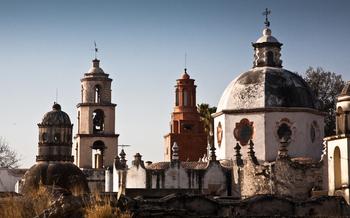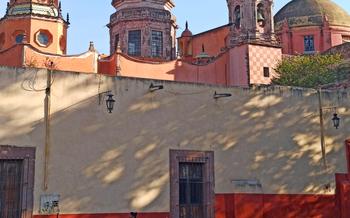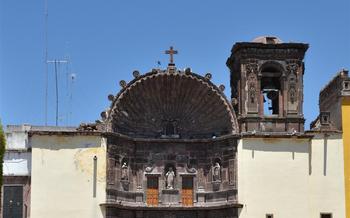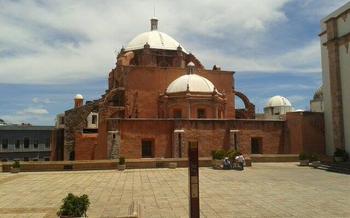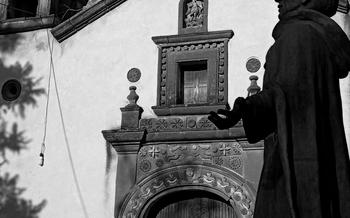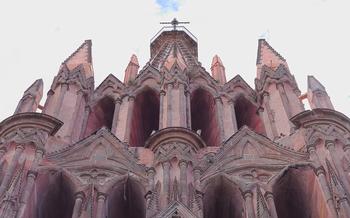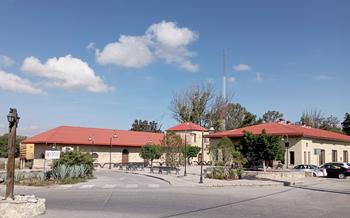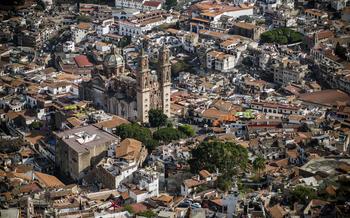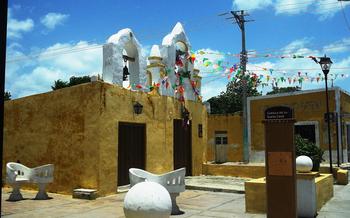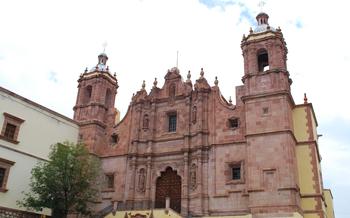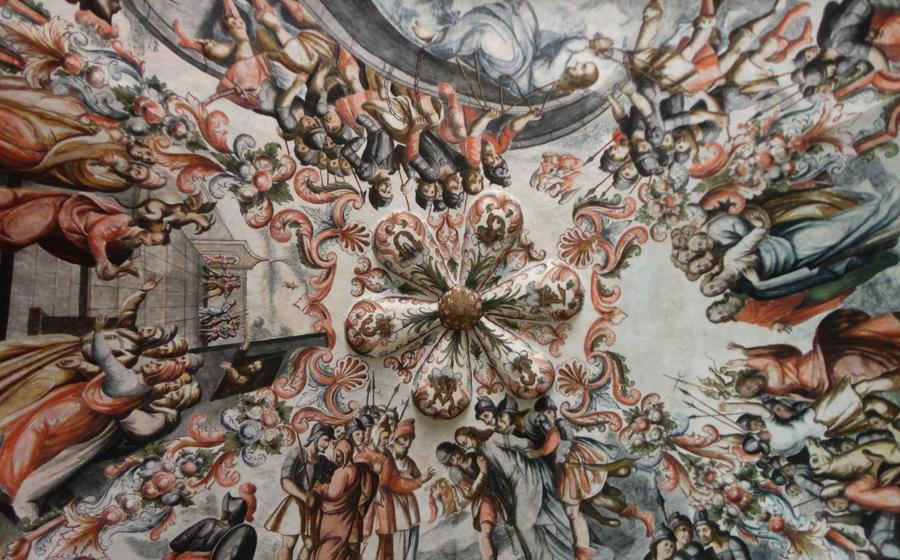
Sanctuary of Atotonilco
- Architectural Marvel
- History of the Restoration
- The Sacristy
- The Chapel of the Third Order
- The Courtyard: A Place of Gathering and Serenity
- Pilgrimage and Religious Significance
- Visiting the Sanctuary
- Nearby Attractions
- Local Cuisine:
- Cultural Events
- An Insider's Perspective: Unveiling the Sanctuary's Secrets
Architectural Marvel
The Sanctuary of Atotonilco stands as a testament to the fusion of Spanish and indigenous architectural styles. Its Baroque-style facade, a captivating blend of curves and intricate carvings, draws the eye upward to the stunning rose window. The vibrant tiles that adorn the facade depict scenes from the life of Christ and the Virgin Mary, adding a splash of color to the otherwise somber exterior.
Inside, the sanctuary reveals an equally impressive display of architectural mastery. The barrel-vaulted ceiling, supported by elegant arches, creates a sense of awe-inspiring grandeur. The walls are adorned with intricate carvings, each telling a story from the Bible. The combination of these elements creates a harmonious and visually stunning space that transports visitors back in time.
History of the Restoration
In the late 20th century, the Sanctuary of Atotonilco faced significant deterioration due to neglect and environmental factors. Recognizing its immense value, a comprehensive restoration project was initiated in 1996 under the guidance of renowned conservators and experts. The restoration process presented numerous challenges, including the removal of layers of grime and overpainting, the stabilization of crumbling walls, and the restoration of delicate frescoes and sculptures.
Using meticulous techniques and adhering to strict conservation principles, the restoration team carefully cleaned and repaired the artwork, preserving its original colors and details. They employed traditional methods, such as lime-based plaster and natural pigments, to ensure the authenticity and longevity of the restoration. The restoration work, which spanned several years, was a labor of love and dedication, resulting in the revival of the sanctuary's former glory and ensuring its preservation for future generations to admire.
The Sacristy
The sacristy is a room adjacent to the main altar, serving as a storage space for religious objects and vestments. Its walls are adorned with beautiful frescoes and artwork, adding to the sacred atmosphere of the sanctuary. These artworks depict scenes from the life of Jesus Christ, the Virgin Mary, and other saints, serving as a visual reminder of the religious significance of the sanctuary.
The sacristy is an important part of the Sanctuary of Atotonilco, as it provides a dedicated space for the preparation and storage of religious items used during ceremonies and rituals. It is a testament to the dedication and devotion of the Augustinian Order, who have meticulously preserved and maintained this sacred space for centuries.
The Chapel of the Third Order
Within the sprawling complex of the Sanctuary of Atotonilco lies the Chapel of the Third Order, a smaller, yet equally captivating space that holds a special significance for the Augustinian Order. Built as a meeting place for the Third Order of Saint Augustine, a group of lay people who dedicated their lives to following the Augustinian rule, the chapel exudes an aura of tranquility and devotion.
The walls of the chapel are adorned with beautiful frescoes and artwork that depict scenes from the life of Saint Augustine and other religious figures. These intricate paintings serve as a visual narrative, guiding visitors through the saint's journey and teachings. The vibrant colors and expressive brushstrokes bring the stories to life, creating a sense of awe and inspiration within the chapel's sacred space.
The altar of the chapel is a masterpiece in itself, adorned with intricate carvings and religious imagery. The central figure of Saint Augustine, surrounded by angels and cherubs, radiates a sense of serenity and wisdom. The altar serves as a focal point for prayer and contemplation, inviting visitors to reflect on the teachings of Saint Augustine and the values of the Third Order.
The Courtyard: A Place of Gathering and Serenity
At the heart of the Sanctuary of Atotonilco lies a tranquil courtyard, inviting pilgrims and visitors to gather and bask in its serene atmosphere. This picturesque space serves as a gathering point, where weary travelers can rest their souls and reconnect with their inner peace.
The courtyard is adorned with a beautiful fountain, its gentle waters creating a soothing melody that fills the air. Lush gardens surround the fountain, adding a touch of color and vibrancy to the serene surroundings. Visitors can stroll through the gardens, admiring the beautiful flowers and plants that adorn the space.
Various pieces of artwork are strategically placed throughout the courtyard, each telling a unique story and adding to the spiritual ambiance of the sanctuary. These artworks depict religious scenes and figures, inviting visitors to contemplate their faith and seek divine inspiration.
The courtyard is a place of reflection and tranquility, offering a respite from the bustling city outside. Visitors can sit on the benches placed around the fountain, immersing themselves in the peaceful atmosphere and connecting with their spiritual side. The courtyard serves as a reminder of the sanctuary's purpose, inviting pilgrims to find solace, peace, and renewal within its sacred walls.
Pilgrimage and Religious Significance
The Sanctuary of Atotonilco holds immense religious significance as a pilgrimage site. Each year, thousands of pilgrims flock to the sanctuary during Holy Week to participate in the annual pilgrimage. This pilgrimage is a testament to the devotion and faith of the local people and visitors alike. Pilgrims often travel long distances, walking for days or even weeks, to reach the sanctuary. Upon arrival, they participate in various religious rituals and traditions, such as processions, prayers, and confessions. The sanctuary is a place of spiritual renewal and reflection, where pilgrims can connect with their faith and seek blessings. The pilgrimage to the Sanctuary of Atotonilco is a unique and deeply moving experience that offers a glimpse into the rich religious traditions of Mexico.
Visiting the Sanctuary
The Sanctuary of Atotonilco is open to visitors from Tuesday to Sunday, from 9:00 am to 5:00 pm. Admission fees are minimal, and guided tours are available in both English and Spanish. To avoid crowds and enjoy a more intimate experience, it is recommended to visit the sanctuary during the early morning or late afternoon hours. Visitors should plan to spend at least two hours exploring the sanctuary, as there is much to see and appreciate. It is important to dress respectfully, as the sanctuary is a religious site. Photography is allowed, but visitors are asked to be mindful of other visitors and avoid using flash photography.
Nearby Attractions
The Sanctuary of Atotonilco is just one of the many attractions that San Miguel de Allende has to offer. The city's historic center is a UNESCO World Heritage Site, and it is home to many beautiful colonial-era buildings, including the Parroquia de San Miguel Arcángel, a stunning Gothic-style church. Another popular attraction is the Museo de las Momias, which houses a collection of naturally mummified bodies that were discovered in the city's catacombs.
For those looking to explore beyond the city center, there are several nearby attractions worth visiting. The Cañada de la Virgen Sanctuary is a beautiful natural area with hiking trails, waterfalls, and hot springs. The town of Dolores Hidalgo, located about an hour's drive from San Miguel de Allende, is the birthplace of Mexican independence and is home to several historical sites.
With its rich history, stunning architecture, and vibrant culture, San Miguel de Allende is a city that has something to offer everyone. Whether you are interested in art, history, nature, or simply relaxing in a beautiful setting, you are sure to find something to love in this charming city.
Local Cuisine:
A visit to San Miguel de Allende offers a delectable journey into the world of traditional Mexican cuisine. Savor the authentic flavors of enchiladas, tantalizing tacos, and the hearty stew pozole, each prepared with fresh local ingredients and bursting with Mexican spices. Indulge in the vibrant culinary scene at local restaurants, where chefs showcase their mastery of traditional recipes and create innovative dishes that honor Mexican heritage. Whether you prefer the casual ambiance of a street stall or the refined elegance of a fine dining establishment, San Miguel de Allende offers an array of culinary experiences to satisfy every palate. Don't miss the opportunity to visit the bustling Mercado de Artesanías, where you can sample local delicacies and find unique souvenirs to cherish your culinary journey.
Cultural Events
San Miguel de Allende is renowned for its vibrant cultural scene, and visitors can immerse themselves in the city's rich traditions and heritage through various cultural events and festivals. The city hosts numerous events throughout the year, showcasing its unique blend of Mexican and international influences.
One of the most significant events is the San Miguel de Allende International Film Festival, held annually in July. This prestigious festival attracts filmmakers, actors, and movie enthusiasts from around the world, showcasing a diverse selection of films, workshops, and special events.
Another popular event is the Festival de la Luz y la Vida, held in November. This festival celebrates the Day of the Dead with colorful parades, elaborate altars, and traditional music and dance performances, offering a glimpse into Mexico's unique Dia de los Muertos traditions.
For those interested in the arts, the San Miguel de Allende Art Festival, held in January, is a must-attend event. This festival showcases the works of local and international artists, with exhibitions, workshops, and art sales, providing a vibrant platform for artistic expression.
To experience the city's vibrant music scene, visitors should not miss the San Miguel de Allende Jazz Festival, held in November. This festival brings together renowned jazz musicians from around the world, offering a diverse range of performances and workshops.
These are just a few of the many cultural events that San Miguel de Allende has to offer. Visitors are encouraged to check the city's cultural calendar for upcoming events and festivals to make the most of their visit.
An Insider's Perspective: Unveiling the Sanctuary's Secrets
As I wandered through the hallowed halls of the Sanctuary of Atotonilco, a profound sense of awe washed over me. The intricate details, vibrant colors, and spiritual energy left an indelible mark on my soul. One particular moment that stands out is when I stumbled upon a hidden passageway leading to a secluded chamber. Within this secret sanctum, I discovered a collection of ancient artifacts and manuscripts that provided a glimpse into the sanctuary's rich history. It was a truly magical experience that deepened my appreciation for this sacred place.
I encourage visitors to explore beyond the main sanctuary and discover the hidden treasures that await. Take the time to wander through the serene courtyard, admire the delicate frescoes in the Chapel of the Third Order, and marvel at the intricate carvings in the Chapel of the Holy Sepulcher. Each corner of this sanctuary holds its own unique story, waiting to be unveiled. Embrace the spirit of discovery and allow yourself to be captivated by the magic of Atotonilco.
